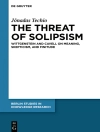Despite the topic’s urgency and centrality, this is the first edited volume to offer a comprehensive assessment of the varying approaches to early engagement with new technologies, including nanotechnology, synthetic biology, biotechnology and ICT. Covering five main approaches to early engagement—constructive technology assessment (CTA), value-sensitive design (VSD), midstream modulation (MM), the network approach for moral evaluation, and political technology assessment—the book will be a pivotal text in the rapidly developing research field of ELSI, which explores the ethical, legal, and social implications of new technologies.
Featuring leading scholars who discuss each early engagement approach in turn, the chapters cover both theory and applications, and include evaluative assessments of specific instances of early adoption of technologies. Further contributions focus on theoretical issues relevant to all approaches, including interdisciplinary cooperation, normativity and intervention, and political and public relevance. The publication has added profile due to the requirement of multi-billion-dollar research programs in the US and Europe to engage in ELSI research alongside that of the technical development itself, even in the early stages. Its comprehensive scrutiny of the core factors in early engagement will ensure a readership of policy makers as well as scientists and engineers.
Содержание
Part 1. Introduction.- Chapter 1. Mandates and methods for early engagement; Schuurbiers, Daan, Doorn, Neelke, van de Poel, Ibo, and Gorman, Michael E..- Chapter 2. Technology Assessment and approaches to early engagement; Grunwald, Armin and Achternbosch, Matthias.- Part 2. Approaches to Early Engagement.- Chapter 3. Constructive Technology Assessment and the methodology of insertion; Rip, Arie, and Robinson, Douglas.- Chapter 4. Value Sensitive Design; Friedman, Batya, Kahn, Peter, Broning, Alan, and Huldtgren, Alina.- Chapter 5. Socio-Technical integration research: Collaborative inquiry at the midstream of Research and Development; Fisher, Erik, and Schuurbiers, Daan.- Chapter 6. Ethical Parallel Research: A Network Approach for Moral Evaluation (NAME); van de Poel, Ibo, and Doorn, Neelke.- Chapter 7. Political TA: Opening up the political debate. Stimulating early engagement of parliamentarians and policy makers on emerging technologies – Attempts by the Rathenau Institute; van Est, Rinie.- Part 3. Reflections.- Chapter 8. Integrating ethicists and social scientists into cutting edge research and technological development; Gorman, Michael E., Calleja-López, Antonio, Conley, Shannon N., and Mahootian, Farzad.- Chapter 9. Collaboration as a research method? Navigating social scientific involvement in synthetic biology; Calvert, Jane.- Chapter 10. Ethicists in the laboratory: Reflecting about non-existent objects; van der Burg, Simone.- Chapter 11. Metaphors and cohabitation within and beyond the walls of life sciences; Pauwels, Eleonore.- Chapter 12. Early engagement and new technologies: Towards Comprehensive Technology Engagement?; Doorn, Neelke, Schuurbiers, Daan, van de Poel, Ibo, and Gorman, Michael E.












